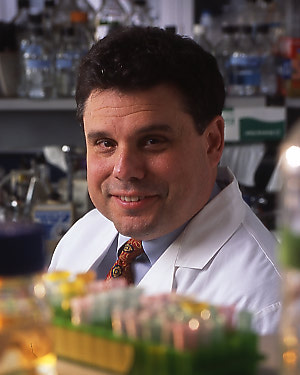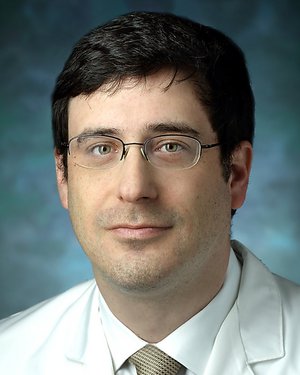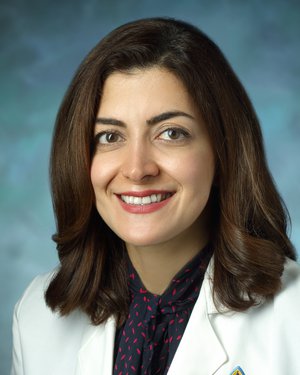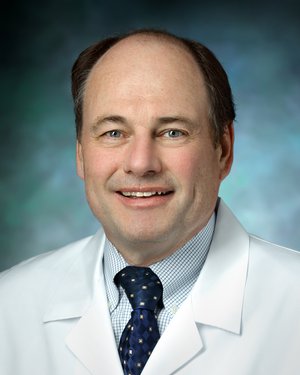-
Richard F Ambinder, M.D., Ph.D.

- Director, Division of Hematologic Malignancies
- Co-Leader, Hematologic Malignancies and Bone Marrow Transplantation Program (HMBMT)
- James B. Murphy Professor
- Professor of Oncology
- Professor of Medicine
- Professor of Pathology
- Professor of Pharmacology and Molecular Sciences
Primary Location: Johns Hopkins Sidney Kimmel Comprehensive Cancer Center, Baltimore, MD
-
Ephraim Joseph Fuchs, M.D.

- Professor of Oncology
Primary Location: Johns Hopkins Sidney Kimmel Comprehensive Cancer Center, Baltimore, MD
-
Richard John Jones, M.D.

- Director Bone Marrow Transplantation Program
- Co-Leader, Hematologic Malignancies and Bone Marrow Transplantation Program (HMBMT)
- Professor of Oncology
- Professor of Medicine
Primary Location: Johns Hopkins Sidney Kimmel Comprehensive Cancer Center, Baltimore, MD
-
Jeffrey Meyer, M.D., M.S.

- Associate Professor of Radiation Oncology and Molecular Radiation Sciences
- Associate Professor of Oncology
- Associate Professor of Surgery
Primary Location: Johns Hopkins Sidney Kimmel Comprehensive Cancer Center, Baltimore, MD
-
Sima Rozati, M.D., Ph.D.

- Director, In-patient Consultation Service
- Assistant Professor of Dermatology
- Assistant Professor of Oncology
-
Lode Jan Swinnen, M.B.Ch.B., M.D.

- Professor of Oncology
Primary Location: Johns Hopkins Sidney Kimmel Comprehensive Cancer Center, Baltimore, MD
-
Nina Delaney Wagner-Johnston, M.D.

- Director of Lymphoma Drug Development, The Sidney Kimmel Comprehensive Cancer Center at Johns Hopkins
- Co-Director of Clinical Research for Hematologic Malignancies
- Professor of Oncology
Primary Location: Johns Hopkins Sidney Kimmel Comprehensive Cancer Center, Baltimore, MD
Our Team
Experts at The Johns Hopkins Kimmel Cancer recognized leaders in the research and treatment of lymphomas and blood disorders. Our experienced and dedicated team provides our patients with innovative treatments and the best quality of care possible.
Our Advanced Practice Providers
Our Physicians
Research Papers
Outcomes of transformed follicular lymphoma in the modern era: a report from the National LymphoCare Study (NLCS). Blood. 2015 Aug 13;126(7):851-7. doi: 10.1182/blood-2015-01-621375. Epub 2015 Jun 23. PMID 26105149.
Summary:
Johns Hopkins oncologist Nina Delaney Wagner-Johnson and others followed 2652 follicular lymphoma patients to see if they could identify any factors related to the transformation of follicular lymphoma into a more aggressive cancer. After 6.8 years, 14.3% of the patients had transformed lymphoma. Factors including the movement of the cancer to more than one site in the body outside of the lymph nodes were associated with the risk of transformation. The researchers also showed that patients who started treatment at their diagnosis had a lower risk of transformation than those who had their cancers observed only. The study compares the risk of transformation with certain drug treatments and calculates the five-year survival from diagnosis for patients with and without transformation.
Clinical outcome following autologous and allogeneic blood and marrow transplantation for relapsed diffuse large-cell non-Hodgkin's lymphoma. Biol Blood Marrow Transplant. 2006 Sep;12(9):965-72. doi: 10.1016/j.bbmt.2006.05.018. PMID 16920563
Summary:
For patients with relapsed diffuse large B-cell non-Hodgkin lymphoma, high-dose chemotherapy followed by a blood or bone marrow transplantation is considered the best option for treatment. Johns Hopkins researchers Alexander Ambinder, Richard Jones and others studied the impact of using bone marrow or blood stem cells taken from the patient versus using marrow or stem cells taken from a donor in 183 people with the disease. For patients with lymphoma that was still responding to chemotherapy treatment, transplantation from a donor appeared to provide longer survival and less relapse, but these patients had a greater risk of dying from their transplant.
High frequency of identical clonal immunoglobulin DNA in pre-treatment tumor and plasma from untreated patients with HIV-associated lymphoma: prospective multicenter trial of the AIDS malignancies consortium (AMC 064). Leuk Lymphoma. 2017 Dec;58(12):2939-2942. doi: 10.1080/10428194.2017.1317095. Epub 2017 May 16. PMID 28508728
Summary:
Patients with HIV may be at increased risk for developing B-cell lymphomas due to gene rearrangements in antibodies called immunoglobulins. Johns Hopkins oncologists Nina Delaney Wagner-Johnson and Richard Ambinder analyzed tumor and blood samples taken from 51 patients with HIV-related lymphomas. They wanted to see if lymphoma-related types of these rearranged antibodies could be found in tumors and in blood. These lymphoma-related types were found in 83% of the tumors studied, and identical types were found in both blood and tumor in 97% of patients. Further research may show that looking at the genes in blood-circulating immunoglobulin types can predict the outcome of HIV-related lymphomas.
